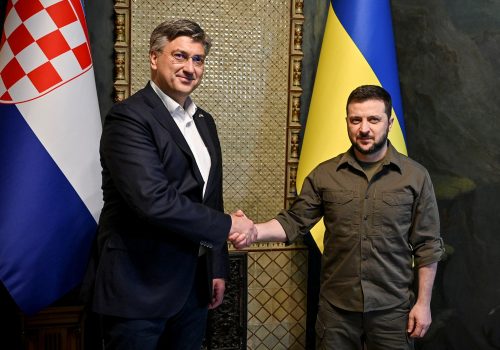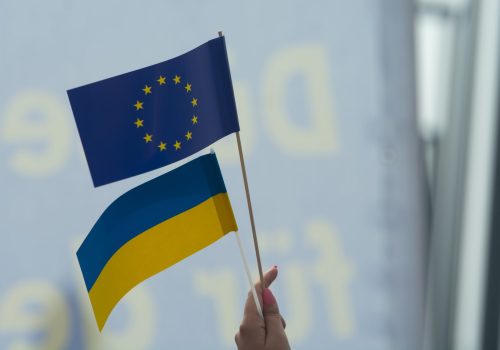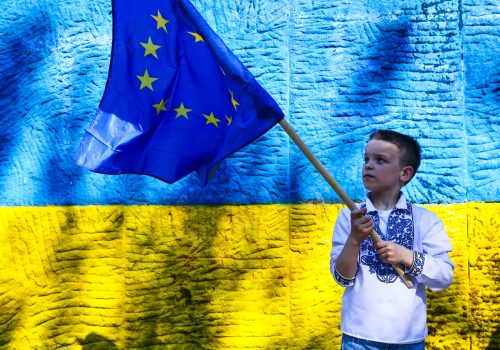June 23, 2022
FAST THINKING: The EU gives Ukraine a shot at membership. What’s next for Kyiv?
JUST IN
Will they join the club? Ukrainians breathed a sigh of relief on Thursday after the European Union’s twenty-seven leaders unanimously approved Ukraine’s (and neighboring Moldova’s) status as candidates to join the bloc. It’s an important symbolic gesture at a time when Ukraine is under attack from Russia—but also far from a done deal for Kyiv. Our experts convey the mood on the continent and explore what the long road ahead for Ukraine might look like.
TODAY’S EXPERT REACTION COURTESY OF
- Melinda Haring (@melindaharing): Deputy director of the Eurasia Center
- Petr Tůma (@PetrVTuma): Visiting fellow at the Europe Center and Czech diplomat
END OF THE BEGINNING
- Despite the major moral victory for Ukraine—which applied for EU membership shortly after Russia’s invasion—Petr cautions that while he’s “convinced” Kyiv will successfully move toward accession negotiations, which is when a candidate country’s conditions for membership are set out, all the hard work is still ahead. This move “doesn’t even mark the opening of accession talks,” he told us, adding that “EU member states have to agree on accession negotiations in the same unilateral way as they did today.”
- Melinda reminds us that Kyiv’s candidacy can be suspended at any time if it doesn’t make the raft of political and economic reforms, mainly to clean up corruption, that the EU requires. “Normally it takes years for countries to move from candidate to full-fledged member status, so this means that Ukraine must put its reforms into overdrive if it wants to stay a member while holding off the Russians.”
Subscribe to Fast Thinking email alerts
Sign up to receive rapid insight in your inbox from Atlantic Council experts on global events as they unfold.

INSIDE THE DEBATE
- Petr says Kyiv’s fast-track candidacy rankled some countries in the Western Balkans such as Bosnia and Herzegovina, which itself is still waiting to achieve EU candidate status. “From what I heard from Brussels, discussions in the Council went longer than expected” because several European leaders raised these reservations, he told us, adding that Ukraine’s supporters in Brussels believe “Kyiv shouldn’t fall victim” to those complaints.
- And anyone still afraid of the financial costs of Ukraine’s candidacy should remember one thing, Petr advises: Brussels will be prying open its pocketbook to rebuild Ukraine anyway. “What would flow to Ukraine in the framework of its EU candidacy will be only a fraction of what the EU should offer for post-war reconstruction” in the country.
- There were also some pleasant surprises in the deliberations, Melinda said, such as a green light from Dutch Prime Minister Mark Rutte—whose population rejected a Ukraine-EU treaty in a 2016 referendum by a margin of around two to one. “He’s willing to take short-term political pain in exchange for doing the right thing morally,” she told us.
FRONTLINE FEARS
- Still, Melinda warns us, there’s a real concern among Ukrainians that “compassion fatigue” is setting in—even in the EU’s frontline states from which she just returned. “In one humanitarian center I visited in Poland, donations are down 80 percent.”
- Meanwhile, she adds, political elites in those NATO countries are increasingly wondering whether they can really bet on collective defense. “Foreign-policy elites in Vilnius are very worried about their own security, and many do not think NATO’s Article 5 guarantees are enough. They want NATO and US troops on the ground.”
Further reading
Sun, Jun 19, 2022
Croatia’s remarkable national journey is a source of hope for Ukraine
UkraineAlert By
Croatia's journey from war and partial occupation by a more powerful neighbor to membership of the European Union is a source of inspiration for Ukrainians as they fight against Russia's ongoing invasion.
Tue, Jun 21, 2022
What would EU candidate status mean for Ukraine?
UkraineAlert By Peter Dickinson
Ukrainians expect the country to be granted official EU candidate nation status at this week's summit of European leaders but what would this mean for Ukraine's broader ambitions for greater Euro-Atlantic integration?
Sun, Jun 19, 2022
EU candidate status for Ukraine is the ideal response to Russian aggression
UkraineAlert By Diane Francis
European Union leaders must decide this week whether to grant Ukraine official EU candidate nation status. This is a critically important moment for Ukrainians that will also shape the future direction of the entire continent.
Image: Crowds in Brussels demonstrate in support of Ukraine being granted European Union candidate status on June, 23, 2022. Photo by Nicolas Landemard/Le Pictorium via REUTERS


